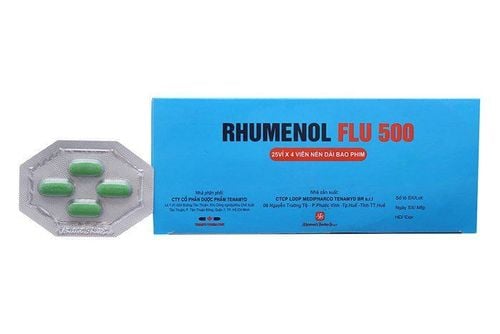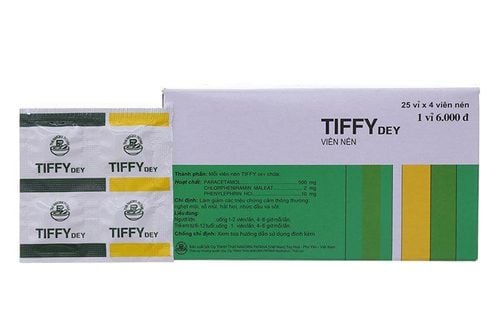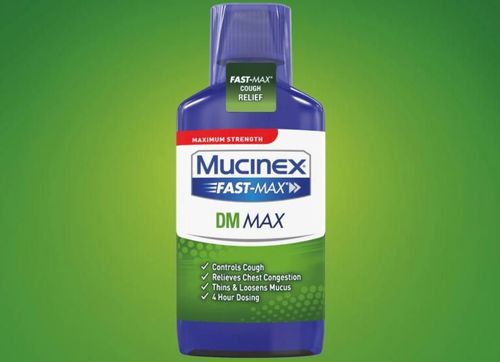This is an automatically translated article.
Sofgard is a medicine indicated in the symptomatic treatment of cough caused by irritation of the throat and bronchi. The drug is circulating on the market with registration number VN-12092-11.
1. What is Sofgard?
Sofgard's main ingredients are:
Dextromethorphan: 10mg; Phenylephrine hydrochloride: 5mg; Chlorpheniramine: 2mg. Sofgard is made in the form of soft capsules and is manufactured and distributed nationwide by XL Laboratories Pvt., Ltd - India.
2. What are the ingredients in Sofgard?
Dextromethorphan hydrobromide is an active ingredient that relieves cough by acting on the cough center in the medulla oblongata. Although the chemical structure of Dextromethorphan is not related to Morphine, its effects are quite similar to Morphine in the treatment of chronic cough without phlegm. Dextromethorphan is often used in combination with many other substances in the treatment of symptoms in the upper respiratory tract. Dextromethorphan has no expectorant effect. Phenylephrine hydrochloride is an alpha-1 sympathomimetic agent that acts directly on alpha1-adrenergic receptors to constrict blood vessels and increase blood pressure. Phenylephrine's blood pressure-raising effect is weaker than Norepinephrine's, however, Phenylephrine's duration of action is longer. Phenylephrine can cause reflex bradycardia, decrease circulating blood volume, decrease blood flow through the kidneys, and decrease blood flow to many body tissues and organs.
At therapeutic doses, Phenylephrine will not stimulate the heart's beta-adrenergic receptors (beta 1 receptors), however in large doses this can occur. Phenylephrine does not stimulate beta-adrenergic receptors of the bronchi or peripheral vessels (beta 2 receptors). At therapeutic doses, the drug (beta 2 receptor) has no effect on the central nervous system. Chlorpheniramine is a drug belonging to the class of antihistamines with sedative effects. Like most other antihistamines, chlorpheniramine also produces an anticholinergic side effect, but this effect varies widely among different patients.
3. Uses of Sofgard
Sofgard is used to treat cough symptoms caused by throat and bronchial irritation in patients with the common cold or when inhaled irritants. Symptomatic treatment of cough without phlegm, chronic cough.
4. Dosage - How to use Sofgard
4.1. Dosage of Sofgard drug Sofgard dose for adults: use 3-4 times a day, 2 tablets each time. Dosage of Sofgard for children from 6 to 12 years old: 3 to 4 times a day, 1 tablet each time. 4.2. How to use Sofgard effectively Sofgard medicine is made in soft capsule form, patients use it orally with a glass of water, avoid using Sofgard with beer, alcohol, coffee or some stimulants. other.
5. Contraindications of Sofgard
Do not use Sofgard for people with a history of hypersensitivity to any of the ingredients in the drug. Sofgard is contraindicated in lactating women and children under 30 months of age.
6. Side effects of Sofgard
Sofgard drugs can cause some unwanted side effects such as:
Side effects of Sofgard on the digestive system: constipation, drowsiness, dizziness, nausea, vomiting; Side effects of the drug Sofgard on the nervous system: drowsiness, somnolence, dizziness; Side effects on the respiratory system are rare: bronchospasm, respiratory depression; Other rare side effects of Sofgard: increased blood pressure. When there are abnormal manifestations during the use of Sofgard, the patient should immediately notify the doctor.
7. Drug interactions of the drug Sofgard
Do not drink alcohol during treatment with Sofgard; Sofgard drugs have the ability to interact with CNS depressants, MAO inhibitors, stimulants; When using Sofgard, it is best for patients to inform their doctor about the treatment drugs they are using so that the doctor can advise correctly, avoiding unwanted drug interactions.
8. Be careful when using Sofgard and how to store it
Patients with the following conditions need to be cautious when using Sofgard:
People who are at risk of respiratory failure and cough with sputum, pus, the maximum time to use Sofgard is not more than 7 days; Sofgard should be used with caution in patients with a history of asthma, narrow-angle glaucoma, gastrointestinal obstruction or bladder neck obstruction; Use caution when using Sofgard in patients with hypertension, heart disease, uncontrolled diabetes, hyperthyroidism; Use caution when using Sofgard for children and infants; People who must drive or need to operate machinery should not use Sofgard. Note the use of Sofgard in pregnant women and nursing mothers: There are no reports on the safety of using Sofgard in pregnant women and nursing mothers. Therefore, it is necessary to weigh the benefits and risks of Sofgard and consult your doctor before taking it.
Overdose of Sofgard can cause symptoms such as: Vomiting, nausea, urinary retention, headache, restlessness, respiratory failure, convulsions... Get medical attention immediately for prompt treatment.
Store Sofgard medicine in a cool, dry place, the temperature is < 30 degrees C, do not leave the medicine in a place with direct sunlight or high humidity.
Sofgard medicine has the main ingredients: Dextromethorphan, Phenylephrine hydrochloride, Chlorpheniramine. Sofgard is used to treat the symptoms of cough caused by irritation of the throat and bronchi in patients with the common cold or when breathing in irritants or certain other respiratory diseases. To ensure the effectiveness of treatment and avoid unwanted side effects, patients need to strictly follow the instructions of the doctor, professional pharmacist.
Follow Vinmec International General Hospital website to get more health, nutrition and beauty information to protect the health of yourself and your loved ones in your family.
Please dial HOTLINE for more information or register for an appointment HERE. Download MyVinmec app to make appointments faster and to manage your bookings easily.













